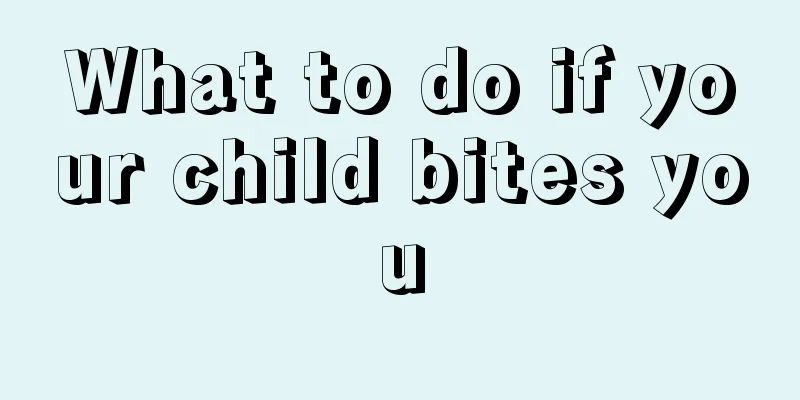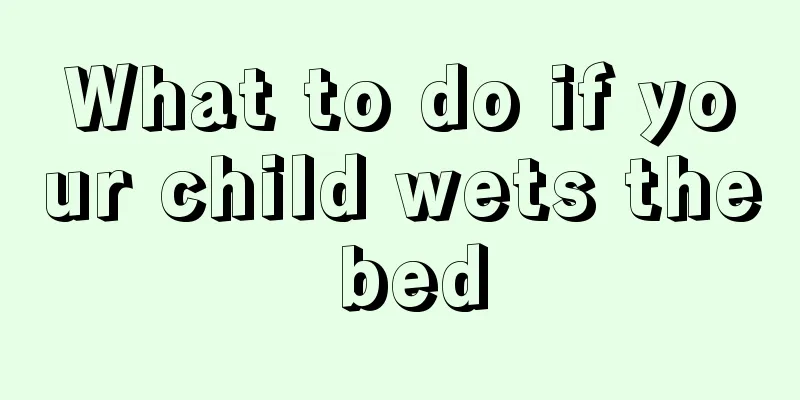What to do if your child bites you

|
Good habits are cultivated from childhood. Well-educated children usually have well-educated parents. Babies are very good at learning. Their parents' usual behavior will have a great impact on them, and then they will naturally develop into their own personality. There are still some children who have some bad habits, such as biting people. As long as parents find reasonable methods, these bad habits can be successfully changed. The first step: control the development of the situation as soon as possible Firmly tell your baby "Don't bite people" and "Don't hit (slap) people". If your baby is very emotional (whether excited or angry), immediately put your arms around him from behind and hug him tightly. After his emotions gradually stabilize, try to take him to comfort the person he hurt, even if it is just a very clumsy apology. It is best to make some remedies for what just happened, and even let the baby help treat the wounds of the injured person. If the baby's emotions cannot calm down for a long time, first apologize to the person he hurt and his family on his behalf, then take him away from the scene and find a quiet place to continue the communication. Tip 2: Understand the reasons behind your baby’s behavior Infer the root cause of the baby's aggressive behavior through quick observation, patient questioning, and calm analysis. Don't question your baby angrily, because the baby often cannot or is unwilling to answer, which will only cause conflict between you and the baby. Hold your baby close and make it clear that you understand the reasons behind his behavior. Tip 3: Tell your baby the consequences of his behavior Tell your baby that being hit or bitten hurts, but never fight violence with violence. It does take a long time to develop a baby's empathy, but if you physically punish your baby, you are implicitly telling him "you can do this next time." Help your baby objectively analyze the possible consequences of his or her behavior, but never make him or her feel guilty. Tip 4: Teach your baby to express emotions correctly Teach your baby how to express his or her emotions without hurting others. For example, if you like someone, hold hands and demonstrate the movements by holding your baby's hands. For example, if you are unhappy and unwilling, say "no" loudly and shout it out with your baby. For example, if you encounter a situation that you cannot handle, ask an adult for help and try to demonstrate each situation to your baby in sufficient detail. Tip 5: Help your baby release stress reasonably Try to help your baby release stress by adjusting the surrounding environment and changing adults' emotional behavior. In addition, prepare some toys suitable for your baby to throw or chew, and take your baby to do something he likes to relieve stress. Tip 6: Don’t over-evaluate your baby’s behavior Too much attention will have a reinforcing effect, so avoid letting your baby hear too much talk about his "hitting" or "biting" behavior, and don't give your baby nicknames like "little bully" because of this. Pay more attention to subtle changes in your baby, and intervene and stop him in time when he shows a tendency to hit or bite others. If your baby still has obvious and persistent aggressive behavior after the age of 4 or 5, you can take him to visit a psychologist. How to soothe a bad-tempered baby Tantrums are an emotional expression of babies when they are extremely frustrated. They become very frustrated when they find that they cannot do something, do it well, or are not allowed to do something. |
<<: What to do if your child curses
>>: What to do if your child has itchy bottom
Recommend
Can children use mouthwash?
Oral hygiene is very important in daily life. If ...
Where should I use moxibustion for children with cold and cough
If a child has symptoms of a cold and cough, you ...
5-year-old baby's intellectual development
During the process of breastfeeding their babies,...
What is the cause of the child's stomach rumbling and vomiting?
For children, the stomach and intestines are rela...
Massage methods for children to enhance their immunity
Children's resistance is relatively poor, esp...
What food is good for children with cold?
Babies are often prone to catching colds due to t...
What to do if your child has blisters in the throat
Throat blisters are quite common, not only in chi...
The reason why children have green poop
Nowadays, children have a richer diet, so they ar...
Children's fever-reducing folk remedies should be used reasonably
It is very common for children to have a fever, b...
What should I do if my 10-month-old baby refuses to eat milk powder?
It is difficult to take care of a baby who is bor...
What are the reasons why babies sweat a lot when sleeping?
The baby's health affects the entire family. ...
How to bask in the sun when you have high jaundice
We all know that the birth of a baby will bring a...
What to do if you don't eat for hand, foot and mouth disease
When babies are sick, they always appear listless...
What to do if your baby is frightened
Babies are easily frightened when they are young....
Tips for weaning your baby from breastfeeding
When the baby grows up and can eat more complemen...









